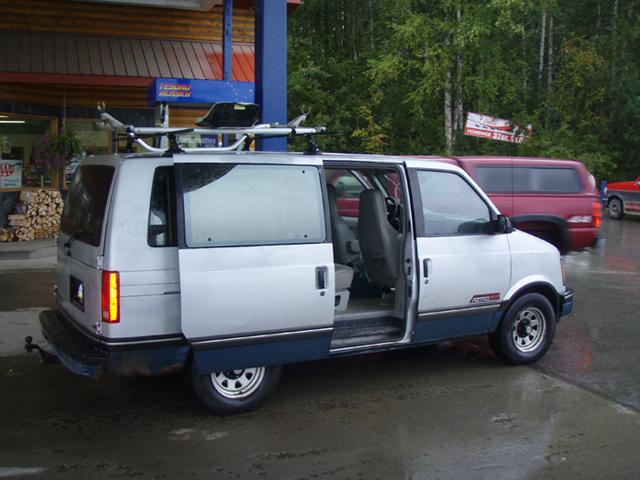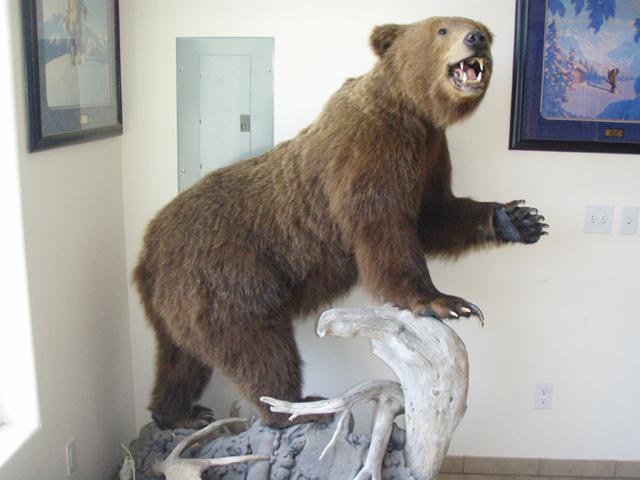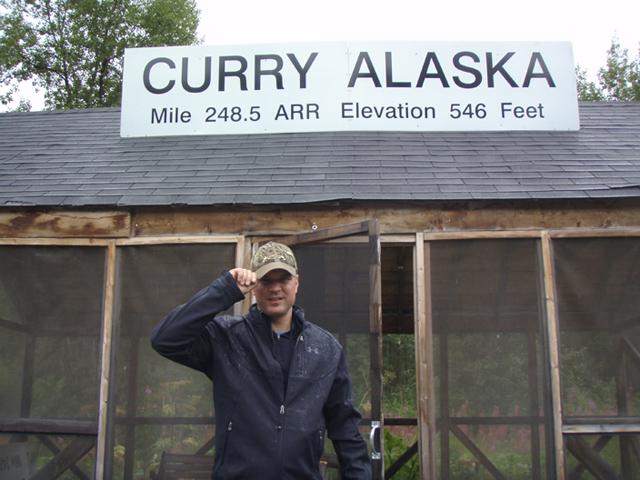5th August
Andy and Aaron come to collect me at 7.45 in the morning.
Aaron is driving again today, and Andy is talking continuously on his cellphone. I manage to pick up from his conversation that it's about my gun. We go to have breakfast in one of Palmer's non-stop restaurants. I've never had steak for breakfast before, but it's one of the choices on the menu, and Andy tells me that it's not unusual here. I order one, as I like a big breakfast.
Our breakfasts have almost arrived by the time Andy finishes his call. It's the best news possible: my gun has arrived at Deadhorse, and is safe with the wife of my future guide. So Andy was quite right when he said that, in Alaska, the postal service works slowly, but surely.
The weather rapidly changes, and the heat of a few days ago becomes just a memory. Yesterday, after our trip on the ATVs, the weather broke, and during our visit to the mine we had the pleasure of a complete downpour.
It's pouring down at the moment, and the clouds are so low I feel we'll crash into them.
Aaron is driving us to Talkeetna.
Talkeetna is probably the place that comes closest to a foreigner's idea of a typical Alaskan town. Like the other large Alaskan settlements, it was founded during the gold-rush. The gold-rush is long gone, but fortunately, Talkeetna remains. There may be a Hungarian hunter treading its sidewalks,but it is best known as a base for Alaskan mountaineers. It is where they start from when they set out to conquer the local peaks, which include Mt. McKinley, a.k.a. The Great One.
The 20,320ft. mountain is the highest point in North America, and is officially known as Mt. Denali, which in the native language means "High/Snowy Mountain". It got the name McKinley in 1896 from a prospector, who named it after the Republican presidential candidate. The miner's propaganda worked so well that McKinley was elected the 25th President of the USA, and was in office from 1897
until 1901. The indigenous people naturally have their own mythology about both their origins, and that of the mountain; as well, they have a story explaining the birth of mankind.



Chapter I.: Arrival
Page 87
It goes like this:
In a village there lived an Indian boy and his three cousins; far away, over the sea, dwelt a beautiful maiden, of a cold and haughty nature, famous for having no interest in men (or women, either... –
G.K.) . The boy must have liked a challenge, because he decided that he would marry nobody but that girl. One day he set out over the sea, taking his three relatives with him for assistance. But, as expected, the maiden rejected him.
The next morning, as they were preparing to leave for home, a mother approached, and offered them her baby daughter, saying she no longer needed her(???). By chance, at that very moment, the cold-hearted maiden went down to the shore to get water, just as the little group was standing there. But, as she was drawing the water, she began to sink into the mud. The boy, in revenge, ignored her cries, (as did the other villagers standing about, though the story doesn't explain why), so the beautiful girl drowned. Watching all this, the girl's father became very angry, and sent his giant black bears down to the shore to create a windstorm. The evil beasts caused such huge waves that the boy's little boat


Chapter I.: Arrival
Page 88
almost capsized. But our hero then took out a stone and threw it into the water (we don't know how he got it, where it came from, or what its magic powers were). Unfortunately the stone's effect only worked around the boy's canoe: those of his cousins were capsized and they all drowned. (Up until now, the three cousins haven't done anything in the story, or appeared in any of its scenes - it's a mystery why they were included at all). But the bears, it seems, rather overdid it, and the waves wiped out the whole village, except for their master, the father of the drownwd girl, and his wife; exactly how they managed to survive is not revealed in the story. Meanwhile, the boy, with the baby, was rowing homewards. Suddenly, for no apparent reason, he jumped up and plunged his harpoon into the crest of a wave. He must have thrown it with great force, because it remained fixed in the wave; then the boy, exhausted from such exertion, fell asleep. When he woke up, marvel of marvels, the canoe was resting amongst the branches of a pine tree, and the wave, into which he had flung his harpoon, had become a mountain. The harpoon then flew out of the mountain, and plunged into yet another wave which, once more, became mountain.
This second mountain was Denali.
But the harpoon didn't stop there; it flew far up into the sky, to a place where ordinary mortals cannot see it, but shamans can.
To complete the happy ending, the boy - still sitting up in the tree - turned around and, to his surprise, found that the baby girl had become a beautiful young woman. And it is from this couple that the whole of mankind originates. (Where all the other people in the tale came from we are not told).
The bad news is that the evil owner of the bears, and his wife, are still alive, but, thankfully, live far away from us.
The mountain is in the Denali National Park, established on 26th February 1907. In 1976 it was classified as a biosphere reserve, though it's not really certain if it was a good idea. Unesco creates these reserves under its Humans and Nature Project, which gives extra protection to the chosen area.
The other aim of the Project, according to the basic deed of foundation of these reserves, is: "They must encourage and demonstrate the balance between the biosphere and human activity." This means that these areas are specially promoted as tourist attractions. The authorities prefer to keep the tourists in a single area, where, for example, they can observe the grizzlies under controlled conditions. For the national parks, this is the best solution, rather than having tourists wandering about all over Alaska, getting into trouble and frightening the game. In figures, this policy results in Denali Park receiving 300,000 visitors per year.
Naturally, I wanted it included in my schedule, and asked Andy to organize a trip. Fortunately he talked me out of it, because the area is now so overcrowded that it no longer truly represents
"Alaska". As there are still many places in the state to visit, which are not tourist paradises, we removed Denali from my program.
Returning to the subject of Talkeetna, it's worth mentioning the motto of this town of 844 people:


Chapter I.: Arrival
Page 89
"Talkeetna where the road ends and life begins."
I doubt if there are many cities in the world which can sum up the philosophy of the local population so precisely and succintly.
My room will be in the Talkeetna Roadhouse, built in 1917. Apparently, as hotels go, it's a pretty cool place; I hope that's true. Half-way to Talkeetna we get some bad news: the so-called Whistle Stop Train is not running. This train is a special service run by Alaska Railroad, the speciality being that it only stops at places requested in advance by the passengers, and not at ordinary stations. This can even be right in the middle of nowhere. There are many people living out in the wilds, as well as others going there for long, or short, periods. The regular travellers on the train are composed of mountaineers, anglers, voluntary hermits and rafting enthusiasts.
We wanted to use this train to get to Curry, another Széchenyi memorial spot. Yes, this is the place where, on 31st August 1935, Széchenyi broke his train journey for a night, staying in a hotel where there was a morning wake-up alarm that apparently woke up everybody.
"It's already dark when we reach Curry. Instead of a station, a nice, modern hotel stands beside the tracks, all alone in the depths of the forest."(Széchenyi )
"It's a neat and clean hotel, the best I've seen since I arrived here." (Széchenyi ) The news about the train is very annoying, as the only reason we're going to Talkeetna is to get to Curry.
Yet again we have to alter the program.
Andy starts making some calls while I watch the rain through the windscreen.
We arrive at the Talkeetna Roadhouse.
I would not call it a good hotel.
It is not a good hotel; not even average.
Let's be honest: it's a youth hostel.
It has two, so-called, "deluxe" rooms, and I take one of them; which means I don't have to share my dreams with three other people.
The stink of grease from the kitchen permeates the entire building, and my room is probably right over it, as the smell seems stronger here. After examining the bathroom, I decide to skip my bath today.
Like my previous hotel, it is built of wood, which means that anyone walking along the ground floor makes the whole building reverberate. But unlike at the Colony Inn, I'm not alone here. There's always someone walking around.
I dump my bags and escape into the fresh air. Andy listens patiently to my complaints. There's been a bit of a misunderstanding, as Andy thought that I liked these "historic" hotels. He came to this conclusion because in Seward I had insisted on the Van Guilder, which is also considered "historic".
But I only chose that place because of the Széchenyi connection; otherwise I like big, modern,



Chapter I.: Arrival
Page 90
comfortable hotels.
Those that have lifts, jacuzzis and large buffet breakfasts. And this isn't one of those. I'll survive one night, somehow, but I'll have to give my all clothes a good airing.
Andy asks me to make a decision.
We can cancel the trip to Curry and stay in the area, as he says there are lots of things to do and I won't be bored.
But I want to go on. I MUST get to Curry.
The only thing to do is to hire a helicopter.
Unfortunately, the weather does not improve, and even the famous bush-pilots are reluctant to take off, but they reassure me that : "Everything is possible, but everything has a price."
Finally, one of the experienced Denali Helicopters pilots, the brave John, agrees to undertake the 25
minute journey. We drive to the airport, and seeing John's machine inspires our confidence. It looks very modern, though it is not much more than a tubular frame, an engine and a fuel tank.
Its jet engine makes so much noise that we put in ear-plugs at once, before we even get around to


Chapter I.: Arrival
Page 91
putting on our headphones. Our equipment is put into containers hanging outside the machine, and John takes great care to distribute the weight evenly. Each bag is weighed several times, and the contents of the containers is constantly rearranged.
At last we take off.
Now that I have some experience of flying in a helicopter I'm no longer nervous and enjoy it much more. We are flying very close to the ground; we have no choice, as the clouds are very low. We find the tracks of Alaska Railroad, and follow them. Below us, the River Sustina appears, and I can see a jet-boat speeding along it.
There's no airport near Curry, so John lands the helicopter on a small, stony patch of riverbank, just a few square feet. We quickly unload everything, and then John is gone, back to civilization.
And we are left here in the wilderness.
Curry station is only a few hundred feet away, so we head off to it, across a small strip of forest.
The hotel is no longer there, sadly; it burned to the ground a few decades ago. This is one of the drawbacks of building everything out of wood. It's hard to find old buildings in Alaska - sooner or later they all burn down. We wander around the vicinity of the station trying to find the site of the hotel. We come across some foundations, but they are clearly of a later date, though Andy thinks it very possible that they were built over the ruins of the hotel. This seems quite plausible, as there is no other flat, open area that would be suitable for a building. Wherever it was, it must have been within a couple of hundred feet of where we are standing.
So I did actually make it.
The pages of his book are coming to life ...
Looking around, I see the same landscape that Széchenyi must have seen in the morning, before he boarded the train. The trees have probably grown a bit, but the river must be exactly the same. We complete the necessary photographic and video records, and then make our way down to the river, where Aaron has already assembled the boat. It's one of the boats we used for white-water rafting, but not the one I was in.



Chapter I.: Arrival
Page 92
Ahead of us lie 25 miles, almost 40 km., of river, the distance back to Talkeetna, all to be covered by boat.
What took 25 minutes by helicopter will take four hours by water. We set off downstream at an average speed of 5mph. It has been raining non-stop since last night. Idiot that I am, I haven't brought my waterproof clothes and boots. Perhaps because Any only reminded me three times that I'd need them. My companions produce some spare clothing from their bottomless packs, but my feet are still being washed by the cold Sustina. It's a real rafting boat, with holes in the bottom so that any water that splashes in can drain away, but, of course, now the freezing water does not drain away, but stays there, keeping my feet nice and cool.
Andy then produces some Miller beer; so there we are, sitting in the boat with numbed limbs, but warm insides; it feels great.
Along the way, on the left bank, I spot my second black bear. It's the size of small pig, and watches our boat with curiosity.


Chapter I.: Arrival
Page 93
It's not bothered when I raise my oar like a gun, and shout "Bang".
It's a long four hours.
I'm constantly teasing Andy about his old GPS, which tells us everything but the right directions.
Sometimes it even tells us we are going away from our destination, but there's always some explanation for its readings - the rain, the clouds, the mountains, whatever - but it still never gets anything right.
To warm myself up, I pretend to row for a while, but I have some bad blisters on my palms from gripping the handlebars of the ATV; I try to get some sympathy from my guides.
I stare at the endless wilderness
This must be what the miners, and the Indians before them, saw. They heard the same silence, looked at the same trees, and the same currents pulled their boats along. But times have changed, and today the boats are made of plastic; the Sustina does not care, and stays the same as ever.
Generations of hunters come and go, but the rivers always remain ...
At 7.00 pm, right on time, despite all the delays, we arrive at our mooring.
The only good thing about my smelly room is that it has WiFi coverage.
Switching on my computer I find an email from Frank Cole, the main organizer of my trip. To go hunting in Canada I have to fill in yet another application for a permit, or whatever, but I really don't feel like doing it right now. I send a reply telling them to sort it out themselves, as I prefer to go off with Andy and his friends for a farewell party at a nearby bar, where there's live music from a singer who sounds just like Chris Rea.
We get very drunk.
Room 327, Pike's Waterfront Lodge
1850 Hoselton Road
Fairbanks




















